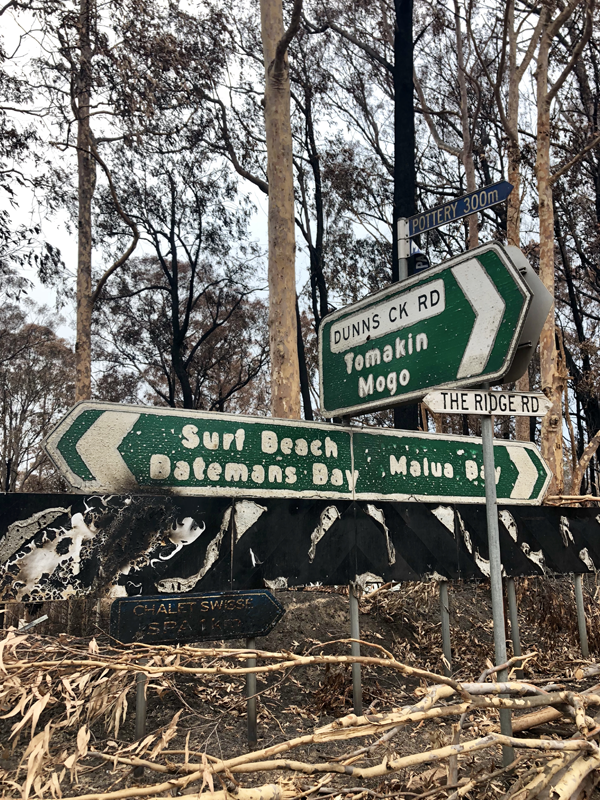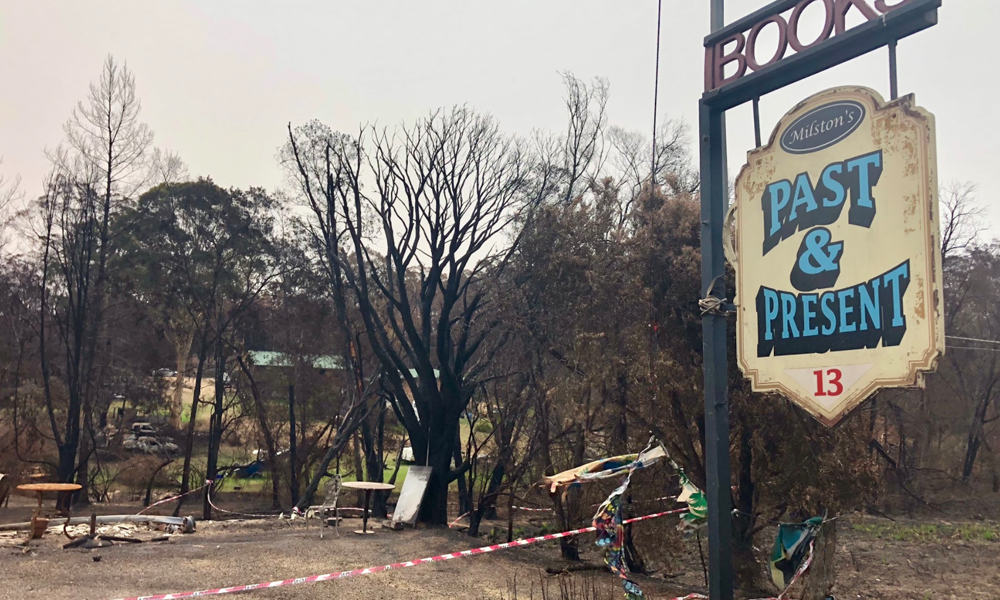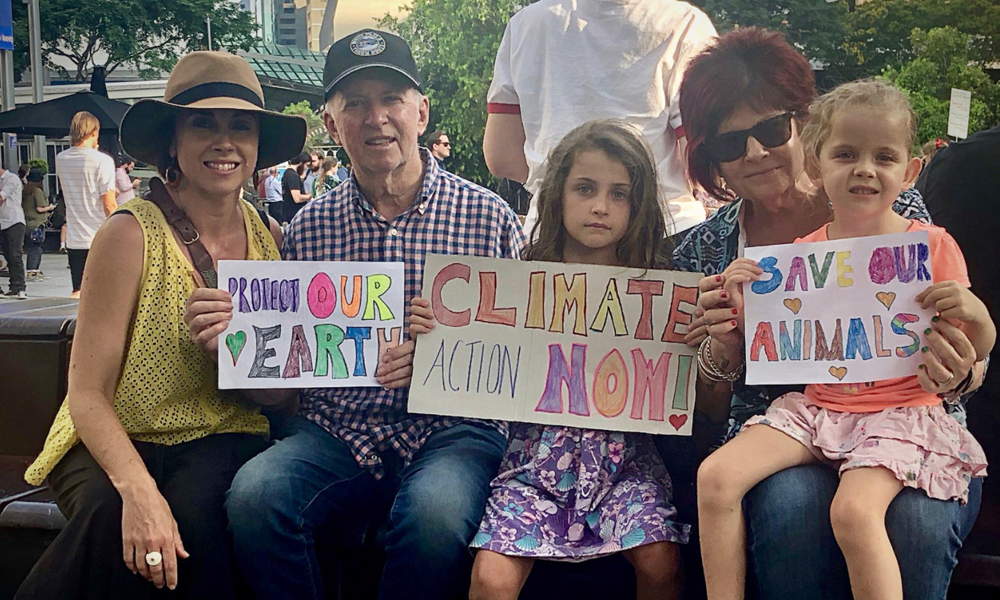In the days since returning to Broulee, our village in the fire-ravaged Batemans Bay area, I've fought to stem my tears.
Our once beautiful coastal forests are black, bare and silent.
As I see them, I cry not only for the families who've lost loved ones. Not only for the decimated vegetation; for the animals, perished. Not only for those who've been robbed of their homes and businesses, so loved because they sat beneath the trees. Or for those who were displaced, still unable to return home.
I weep for all of those things, but also because of a crushing fear in my heart. It's a fear for my daughters' future. It's a nightmare that's existed inside my head, but can now be seen, smelt and touched. Relentless fires, blackened forests, bone-dry land and villages destroyed are now a frightening reality.

Image: 'Between Broulee and Batemans Bay', supplied by the author
For months, Prime Minister Scott Morrison has played down the bushfire crisis, insisting that the fires were 'normal' (that is, the old normal). He's since been compelled to talk about the accepted links between climate change, Australia's drought and the fires. This week, Mr Morrison pivoted his messaging, urging us to accept that summers such as this one are our new normal.
From the fire zone, I say – we must not.
My husband, my daughters and I weren't at home when the fire front approached our village on New Year's Eve – we'd left for Victoria a few days earlier and once fire engulfed the region, we couldn't return. On that heartbreaking final day of 2019, we heard stories of the sky turning red as a wall of flames bore down on our village. We anxiously awaited news that our family and friends were safe. That our home was still standing.
A last-minute change in wind direction saved most of our village that day. The surrounding villages were not so lucky. Fire reached the township of Mogo, narrowly missing the famed Mogo Wildlife Park. It destroyed Mogo's historic Gold Rush Colony and several other structures, including main street businesses and the local Aboriginal Land Council building. It ran up through the back of Batemans Bay and through Surf Beach. It raged into Malua Bay, destroying homes and flattening the bowling club (its Chinese restaurant was a favourite with locals). It tore through the village of Rosedale.

Image: 'Remains of a favourite Mogo bookstore', supplied by author
After a brief reprieve, fire conditions again worsened. My husband returned to support his family and defend our home, and theirs. As our friends and family went for days without power or communications, with food and fuel supplies cut, my daughters and I took refuge in the comfort of my childhood home in Brisbane.
While awaiting news of the fate our communities, I was struck by a surreal 'normal' in lush, green Brisbane. Images of the bushfire devastation dominated the news, as we drew support from our wonderful family and friends. But we were spectators of the emergency, while ensconced in regular city life. The lives of Brisbane folks remained largely untouched. Unchanged.
In returning home to a new reality, I've felt a strange mix of gratitude and heartbreak. We're incredibly lucky because our home's intact and our friends and family are safe. The crisis has brought out the best of the human spirit – the love and support shown by locals, and folks concerned from afar, has been truly incredible.
But hundreds of homes are lost and our communities remain in peril. Our loved ones are recalling the trauma of fire threatening their lives and the lives of their children. Children wake from nightmares of fire approaching. Local growers have lost their farms and their livelihoods. Our tourism trade is stunted and some businesses will not rebuild. Our beaches are covered in ash. Fires still burn, not far to the west. We're torn between relief and an unsettling state of high alert.
In finally accepting this fire season is unprecedented, Mr Morrison has signalled the need to 'prepare practically' for 'longer, hotter, drier summers'. He flagged 'resilience and adaptation' as top priorities, over the need for stronger mitigation measures.
The government continues to claim to be 'doing its bit' for climate action. This week, Minister for Industry, Science and Technology Karen Andrews said she was confident Energy Minister Angus Taylor would deliver on emissions reductions targets. But recent assessments show we won't hit our 2020 emissions reduction target until 2030. And analysis of the government's own projections show the Department of Environment currently expects no emissions reduction progress this coming decade.
The Australian Academy of Science recommended a holistic response to the bushfire crisis, highlighting the need to strengthen Australia's climate ambition:
Australia must take stronger action as its part of the worldwide commitment to limit global warming to 1.5° C above the long-term average to reduce the worst impacts of climate change.
Adaptation – surviving – is vital, yes, but to neglect urgent mitigation measures is to rob our children of the natural blessings we have enjoyed. It’s to deny them the right to thrive. We simply cannot continue with business as usual.- .
If you're outside of the fire zones, I ask that you imagine your family is in a bushfire-affected area. Can you accept that it's too late to change course? That we should consent to this frightening reality, rather than fighting for a better one?
If the answer is no, we must be all in. As parents, carers, grandparents, uncles and aunts, we must come together to demand that our elected representatives deliver immediate, legitimate climate action.
All of us. Now.

Image: 'Kat McCarthy, with her parents and daughters at the January 10 Brisbane climate protest', supplied by the author
The solutions are available. We can:
- Transition to renewable energy and improve energy efficiency
- Shift our transport systems to shared and electric vehicles
- Prioritise a fair transition for those impacted by the climate crisis (including fossil fuel communities and Indigenous communities)
- Commence rapid drawdown of emissions using natural climate solutions
- End food waste
For more on climate solutions, take a look at Project Drawdown, 2040 and Beyond Zero Emissions.
We must compel the political will, and time is running out. Let's raise our voices to a volume that can't be ignored. There are countless ways you can – become involved with 1 Million Women, Australian Parents for Climate Action, Extinction Rebellion, AYCC, SEED, Doctors for the Environment, among many others. Join Zali Steggall's push for a Climate Change (National Framework for Adaptation and Action) Bill, which is a step in the right direction.
Here in the fire zone, there's no choice but to deal with our current 'normal'. I truly hope it's never yours.
By Kat McCarthy Local organiser, Australian Parents for Climate Action from Broulee, South Coast NSW

